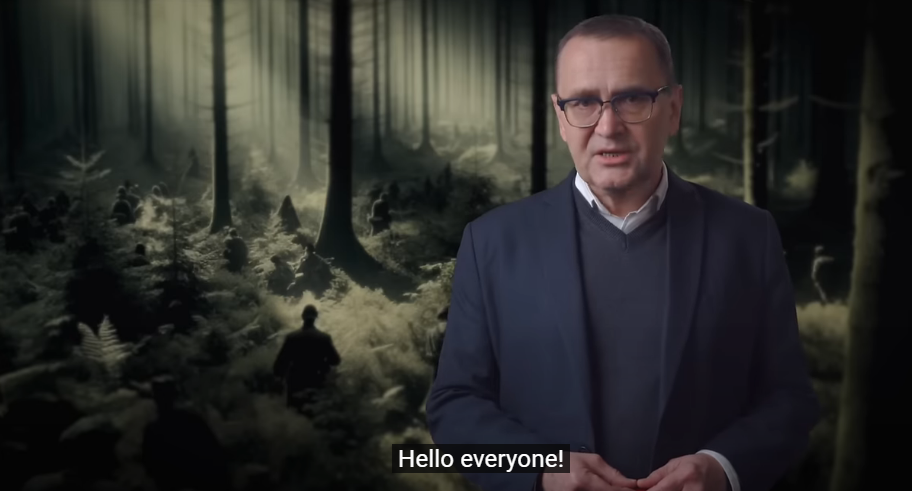
Between Myth and Truth. Jewish Partisans During World War II
(For high school students, teachers, and adults). This 18-minute video reveals the facts behind the illusion that Jewish partisans engaged in armed combat against occupying German forces. [To read the speaker’s Polish narration in English, click on the CC (Closed Captions) icon on the bottom right of the video.]
A partisan is a member of an irregular military group that is not part of a country’s national armed forces and uses irregular warfare to fight against a foreign occupying army. Irregular warfare, also called guerilla warfare, avoids large-scale combat and instead relies on small, stealthy, hit-and-run engagements against the enemy. The most common idea of “partisans” is the resistance fighters of World War II, particularly in the case of Poland. Polish partisan groups fought against the occupying German and Soviet armies, as well as against Soviet partisans and the Ukrainian Insurgent Army.
Poland’s Home Army (Armia Krajowa – AK) was the largest Polish partisan organization. The Peasants’ Battalions (Bataliony Chlopskie) were partially integrated with the Home Army and its major actions took place in the rural Zamosc area, which was chosen for German colonization as part of Generalplan Ost. The National Armed Forces (Narodowe Sily Zbrojne – NSZ) fought against both German and Soviet forces, and also fought Soviet-backed communist organizations during and after the war. The People’s Guard (Gwardia Ludowa, GL) was a communist resistance organization that fought against the AK, NSZ, and Bataliony Chłopskie, and was later renamed as the People’s Army (Armia Ludowa, AL).
Jewish partisans are often portrayed as “heroically resisting the Germans”; however, as this video shows, they did not engage in armed combat. In the case of the Bielski brothers who operated in the northeast areas of German-occupied Poland, although they had weapons, they never used them against the Germans.
As will be seen, David Zwick’s portrayal of the Bielski brothers in his film “Defiance”, is far from historical fact. The Bielskis operated as a supply base for Soviet partisans that were engaged in wide-scale operations to wipe out Polish underground resistance units. The Bielskis and other Jewish partisan groups robbed entire villages, many of which were previously robbed by the Soviets and Germans, and some of which were pacified by the Germans. “Pacification” involved the destruction of entire villages including women and children, the burning of homes, and confiscation of private property.
The Bielskis brutally robbed villagers of food, clothes, farm animals, and equipment. As the video shows, even more ruthless were the Jewish partisan units headed by Simcha Zorin, an alcoholic, and Shlomo Brandt. In addition, Jewish partisans were members of Soviet partisan units that purposely attacked Polish villages that established self-defense units. This was the case with the village of Koniuchy, which represents one of the greatest crimes committed by Jewish partisans in World War II. The video also identifies many other villages that were subjected to the same terror, including Naliboki.
Jewish partisans fought in and alongside Soviet partisan units, all of whom followed Moscow’s orders to subjugate Poles in Poland’s eastern territories by destroying all non-Communist partisan units (e.g., AK, NSZ) and terrorizing the rural Polish population into submission. Polish Underground and Jewish sources verify the considerable numbers of Jews serving in the Soviet partisan units. As a result, Jews who collaborated with the Soviets deliberately chose to make themselves enemies of the Polish nation. Jews were also prominent in the communist-aligned GL-AL, which fought against the AK and NSZ. In addition, after the Soviet Army occupied these northeastern areas at the end of the war, a large number of Jewish partisans joined the Soviet-controlled communist party apparatus and the NKVD (Soviet Secret Police) in the Soviet Republics of Lithuanian and Belarus.
The video ends by assessing two contrasting views of an imperative ethical argument. The Jewish position asserts that the German policy to eradicate Jews forced them to escape the ghettos and become partisans, which would enable their survival. The Polish viewpoint maintains that Jewish partisans chose to rob, rape, and murder Polish, Lithuanian, and Belarusian villagers rather than establish an arrangement in which they would coexist with rather than brutalize the local population. In the case of the Bielskis, they were Polish citizens and Tuvia enlisted in the Polish Army. Regrettably, instead of joining with the Polish resistance, Tuvia collaborated with the Soviets against local Poles when the Red Army occupied the area during 1939-1941 and continued to do so throughout the war.
